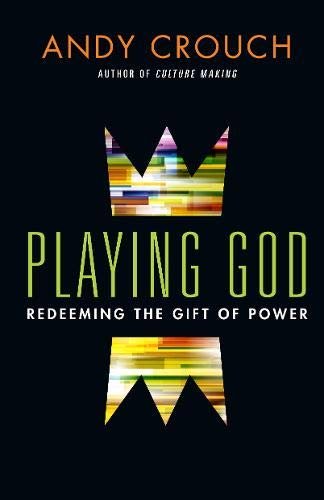Playing God
Lord Acton’s dictum about the link between power and corruption is well known. And in those rare cases when we actually stop to think about power, that’s generally as far as we go. But the provocative claim made in this book is that power is also a gift. It’s a gift easily abused and in need of redemption, certainly, but a gift nonetheless.
Building on his earlier work, Culture Making: Recovering Our Creative Calling, Andy Crouch argues that at its best, power is creative—it makes something of the world for the good of all. This concept of creative power is rooted in the cultural mandate of Genesis 1:28, in which God instructs Adam and Eve, his image bearers, to “be fruitful and multiply and fill the earth and subdue it.”
As we reflect on human history and as we deal honestly with the failures that so often characterize our own lives, it is apparent that we haven’t always “subdued the earth” in God-honoring and others-serving ways. Indeed, this is the dangerous nature of our God-given power. When twisted by sin, power becomes destructive. This is why we instinctually decry power as inevitably evil, or why we do what we can to avoid it altogether. But if Crouch’s thesis is right—that power is a gift entrusted to us by God for the common good—it would be wrong to eschew our power, even if such a thing were possible.
The title of the book comes from Jayakumar Christian, national director of World Vision India and author of God of the Empty-Handed. As Crouch tells the story, during a visit to India, Christian helped him to see that injustice is the direct result of “god-playing” in the lives of the poor. From malevolent slave owners at brick kilns, to benevolent Western teenagers going to “save” slum dwellers on a two-week mission trip, god-playing is what happens when power is used to dehumanizing effect in the lives of God’s image bearers.
In a key insight that bears further reflection, Crouch makes the case that idolatry and injustice are inseparably linked because both marr the image of God in the lives of others and ourselves. Made to “play God” as beings imbued with culture-making “creative love,” we dishonor God and others when we use the power entrusted to us for selfish, destructive means. Christians of pietist and activist persuasions especially—prone as we are, at times, to lopsided emphases—would do well to ponder the interrelatedness of idolatry and injustice.
Crouch also urges us to take the power of institutions seriously. It is not enough to consider power in merely individual terms; after all, power is most insidious and destructive at an institutional level. But it’s also through healthy institutions that injustices can most thoroughly and sustainably be corrected. Activists may not be known as individualists, but many have strong anti-institutional biases—preferring grassroots movements. Though movements are valid in their own right, we would do well to consider how we can contribute to the creative power of well-ordered institutions.
In the end, power is for human flourishing, and it takes the shape of the cross. Like Christ, who loved us and gave himself up for us, “we are meant to pour out our power fearlessly, spend our privilege recklessly, and leave our status in the dust of our headlong pursuit of love.” That is our calling. That is what it means to play God in the truest sense.
This review originally appeared in PRISM, a publication of Evangelicals for Social Action.
